|
|
|
Sort Order |
|
|
|
Items / Page
|
|
|
|
|
|
|
| Srl | Item |
| 1 |
ID:
162017


|
|
|
|
|
| Summary/Abstract |
This article empirically evaluates the comparative importance of human rights and counterterrorism during Senate subcommittee hearings on US foreign aid. Drawing on, and further developing, international regime theory, the article predicts that the human rights regime will be resilient to the September 11 shock to the international system. Qualitative content analysis of discourse during the seven years before and after the 9/11 attacks demonstrates the predominance of the human rights regime—even post-9/11, when the counterterrorism regime emerged as a competitor. The article explains why this is the case and offers insight to the human rights regime’s resilience.
|
|
|
|
|
|
|
|
|
|
|
|
|
|
|
|
| 2 |
ID:
162019


|
|
|
|
|
| Summary/Abstract |
This article contributes to the burgeoning norms literature in international relations that conceptualizes the norm life cycle as a nonlinear dynamic process that is open to contestation and change of “meanings in use.” There are limitations to this second generation of norms theory, however, most crucially in the identification of agency and process through which dialogue occurs and change is enacted. This article claims that to conceptualize the move from norm contestation as dialogic process to norm implementation as a process that weaves norms into the fabric of institutions in their day-to-day politics and routine practices, there is a need to bring IR norms theory into a fruitful engagement with sociological theory on lawmaking. Sociolegal approaches account for institutional processes that move toward the firming up of norms even if hard law status is not the formal objective. This article applies a sociolegal framework of the recursivity of lawmaking to better understand the current diversification of responsibility to protect implementation efforts across the UN and at the national level.
|
|
|
|
|
|
|
|
|
|
|
|
|
|
|
|
| 3 |
ID:
162021
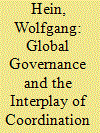

|
|
|
|
|
| Summary/Abstract |
Developing an adequate sustainable energy supply in developing countries is a major challenge for the global community. Recently, a large number of organizations and enterprises have been supporting technological development, carrying out advocative actions, and offering finance for renewable energy. Concomitantly, there have been strong calls to improve coordination in this field. This article elaborates on the importance of institutional opportunities not only to favor coordination, but also to contest common wisdom shaping energy policies and specific project features at a given time. The result would be a more flexible renewable energy “governance dynamics” to provide the institutional framework for private actors and the interaction with public entities. Thus, three dimensions of global governance are analyzed: coordination, contestation, and the resulting process of collective/interactive regulation.
|
|
|
|
|
|
|
|
|
|
|
|
|
|
|
|
| 4 |
ID:
162018
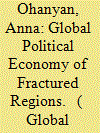

|
|
|
|
|
| Summary/Abstract |
Despite ebbs and flows in comparative regional studies over the past few decades, the regional dimension of world politics is gaining sustained attention from scholarly and policymaking communities. Thus far much of the focus has been on regional integration, which is traditionally viewed as a necessary condition for economic development and security provision. This article describes the problem of regional fracture in conflict regions; it delineates the political and economic dimensions of regional fracture; and examines the security implications of each. It examines the problem of fractured regions in Russia’s post-Soviet neighborhoods, the Balkans, and sub-Saharan Africa. The article concludes with implications for security policy as exercised by the West in the post-American world.
|
|
|
|
|
|
|
|
|
|
|
|
|
|
|
|
| 5 |
ID:
162014


|
|
|
| 6 |
ID:
162016
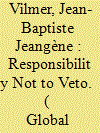

|
|
|
|
|
| Summary/Abstract |
The responsibility not to veto is the idea that the Permanent Five at the UN Security Council should voluntarily refrain from using their veto in the event of atrocities. There are currently three veto-restraining initiatives, one of them from a P5 member, France. Despite its importance in diplomatic and UN circles, this debate has attracted little academic attention. This is partly because of the difficulty to access primary sources such as the details of the French proposal that circulated among the P5. Empirically focused and using diplomatic archives and experience, this article intends to fill such a gap. It provides the most detailed picture of the RN2V genealogy to date while offering a behind-the-scenes perspective on how the idea emerged and developed inside the French administration. It then unpacks the French strategy, its motivations and diplomatic efforts toward the P5, Group of 4, other states, and nongovernmental organizations, and eventually makes four recommendations for the initiative to have a chance of progressing among the Permanent Three.
|
|
|
|
|
|
|
|
|
|
|
|
|
|
|
|
| 7 |
ID:
162022


|
|
|
|
|
| Summary/Abstract |
Global energy governance has received increased attention from scholars and policymakers in recent years. Much of the discussion has focused on the inadequacy of the current institutional architecture, particularly in light of the urgent need to decarbonize energy systems. However, little attention has been given to the capacity of global institutions to promote investment in renewable energy. This article considers claims by proponents of the Energy Charter Treaty, the most developed trade and investment treaty in the global energy architecture, that it can play an important role in this regard. Specifically, it examines the ECT’s investor-state dispute settlement mechanism. Drawing on scholarship in global governance, law, and economics and an analysis of recent investor-state disputes, the article argues that there are problems with the assumptions underlying the claims of the ECT’s proponents. Critically, there is still a lack of evidence that the ECT has a positive impact on flows of investment in any sector, including the renewable energy sector. There is also a risk that ISDS could be used by the fossil fuel industry to impede a clean energy transition. States should approach accession to the ECT with caution and consider other mechanisms to reduce risk for renewable energy investors.
|
|
|
|
|
|
|
|
|
|
|
|
|
|
|
|
| 8 |
ID:
162020
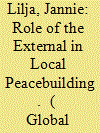

|
|
|
|
|
| Summary/Abstract |
Local peacebuilding has been embraced in principle by many donors, but the practice of external support to local initiatives needs further systematic study. While previous research has exposed the weaknesses of externally supported peacebuilding, less attention has been given to alternative strategies that can be taken to scale. This article puts the focus on international nongovernmental organizations as key intermediary actors in peacebuilding, and how they deal with dilemmas attached to local peacebuilding support. It contributes to the research on external-local dimensions of peacebuilding practice by identifying constructive functions that can be fulfilled by INGOs in situations where local institutions and actors are not able to address conflict on their own. Specifically, it uncovers the role of INGOs as risk absorbers and enablers of local peacebuilding action through the accompaniment of local partners.
|
|
|
|
|
|
|
|
|
|
|
|
|
|
|
|
| 9 |
ID:
162015
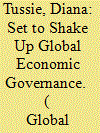

|
|
|
|
|
|
|
|